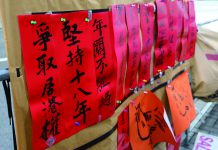As a student preparing to take public examinations, Lee understands the advantages of EMI classes as most lectures and classes in tertiary education in Hong Kong are in English. However, she also hopes she can get better grades by studying in Chinese.
Fung Wai-wah, president of the Hong Kong Professional Teachers’ Union, says: “The fact that more capable students can learn in English, doesn’t mean that they get better academic results because of EMI.” As a teacher, Fung thinks that mother-tongue teaching can better facilitate students’ communication and understanding.
However, he thinks the government’s fine-tuning policy exacerbates a mistaken impression that mother-tongue teaching is inferior to EMI. He says the misunderstanding came about when the government allowed the co-existence of EMI and CMI schools when mother-tongue teaching was launched.
“The Education Bureau should insist when there are good objectives and research to support the policy,” says Fung.
For Fung, the introduction of fine-tuning effectively puts an end to mother-tongue teaching by tacitly admitting that it was a false step that needs to be reversed. “Fine-tuning implies that you succumb to the situation. How then, can we propose mother-tongue teaching again?” asks Fung.
Looking back on the raft of changes to the education system over the last 20 years, Fung says policies were implemented too rapidly and teachers have found it hard to adapt to the messy reforms. “Teachers and schools are chasing the changes exhaustedly,” says Fung. “In many situations, they are forced to follow the policies even when they disagree with them.”
Joseph Wong Wing-ping, who was Secretary for Education and Manpower when the mother-tongue teaching policy was implemented, reiterates that the policy was launched with the support of the education sector and after exhaustive research.
“But the government and people from the education sector did underestimate parents’ opinion at that time,” says Wong. “We should learn a lesson from this execution.”
For Wong, every education policy should only be implemented after in-depth consideration and continuous evaluations. He takes the teaching of Chinese in Putonghua as an example.
“How can you implement PMIC suddenly without any reasons?” asks Wong, “Do the education reforms really help students after all? This is questionable.”
Wong says that instead of pushing ahead a policy arbitrarily when there are problems, the government should try to improve it.
“I remember clearly that one of the objectives of education reform was for students to find joy in learning,” says Wong.
Instead of joyful learning, Wong finds today’s students are taught to “drill and kill”. “Don’t we need an evaluation when we are getting off the track? I think it is worth reviewing,” he says.
Edited by Gloria Lee









































